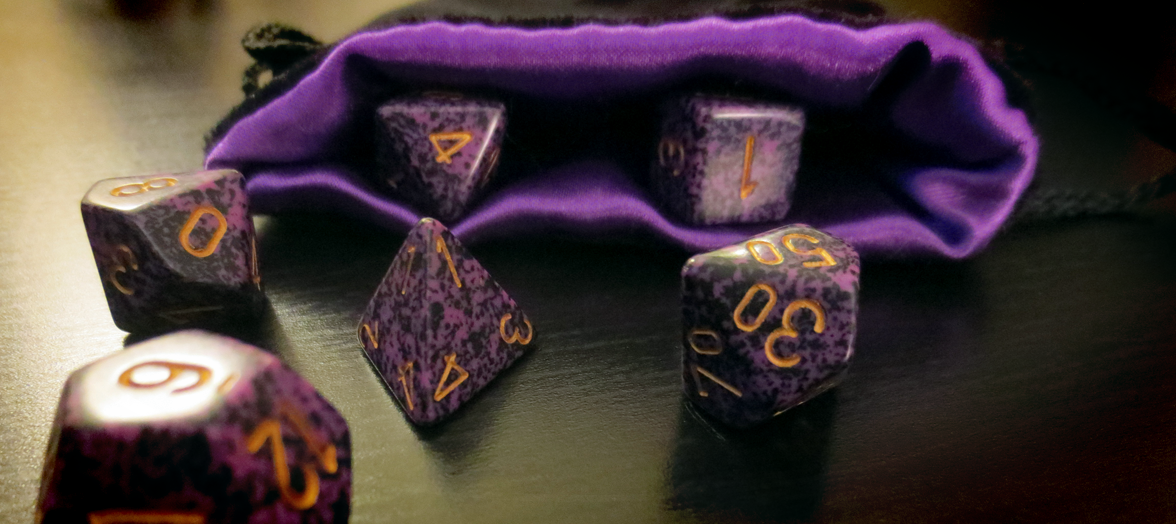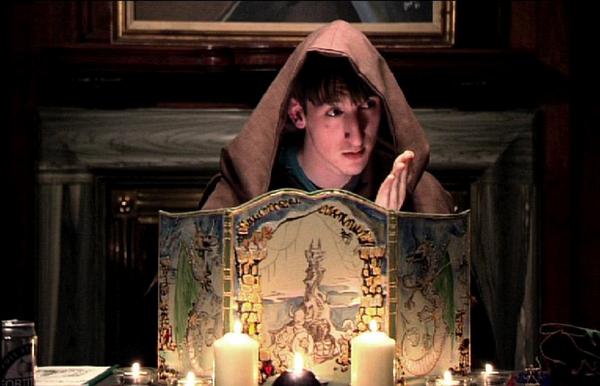 I’ve been a dice carrying geek since I was six. For those not familiar with games like Dungeons & Dragons, you sit around a table method acting. Each person assumes the role of a character, and one person is the game master. The game master helps the players interact with a shared, fictional world.
I’ve been a dice carrying geek since I was six. For those not familiar with games like Dungeons & Dragons, you sit around a table method acting. Each person assumes the role of a character, and one person is the game master. The game master helps the players interact with a shared, fictional world.
Being a game master offered an incredible opportunity to learn storytelling. Every day after school we’d get together, and my friends would expect me to weave a tale to entertain them.
I learned about plot, conflict, and characterization. Every game session honed my craft. I’d get immediate feedback, because it I used a lame story idea or trope, the players would tell me. This proved to be immensely powerful, because I was learning reader psychology without evening understanding what I was doing.

Years of careful observation taught me that different people played for different reasons. My friends fell into three specific play styles, which influenced the type of books they liked to read.
Those types are Tactical, Narrative, and Simulation.
Any given player valued all three types of play, but one of those types was usually much more dominant. Violate that, and that person would mentally check out of the story you were trying to tell.
So what are the three different styles?
Tactical
The first group played because they loved overcoming obstacles. Their characters possessed spells and abilities needed to overcome those obstacles, and the most fun they had was in figuring out how to do that.
They usually loved combat, but also enjoyed any area where they were able to use their character’s abilities to overcome something.
These players read novels with large battles and a lot of detailed tactical maneuvers, but found series like The Wheel of Time incredibly boring.
Narrative
Some of my friends loved story above all else. They wanted to know why they were questing to kill the dragon, why the baron betrayed them, and what the world had been like before the dwarves were wiped out.
These players cared about the characters. They wanted to know more about them, and their lives.
Narrative players were the most rare, and usually became game masters in their own right. Almost all of them loved to devour fantasy novels, especially long series with an overarching plot.
Simulation
This last type of player valued suspension of disbelief over all other considerations. They wanted to inhabit a living, breathing world. They wanted to know how the magic worked, how the politics of kingdoms worked, the life span of different races, and every other detail— both fantastic and mundane.
Inaccuracies or plot gaps drove players like these from the table. These players also loved to read, though they rarely became game masters. The books they preferred were well researched and true to life.
Why Readers Lose Interest
So what do these player types have to do with your readers?
Every reader has a different set of reasons for devouring books. Some are looking for raw escapism. Some want to experience a specific emotion. Some want to learn something.
If you violate their expectations you’ve just lost a reader. They demand a certain emotion and / or experience, and you’d better deliver.
A few weeks back I ran a game for some guys I’ve known since high school. They’re narrative players, and they wanted a narrative game. So I ran one, and they loved it.
My Saturday night Pathfinder game is full of tactical players. They don’t care what the dragon’s name is. How many hit points does it have, and how big is the cone for the breath weapon?
If you tried running a narrative game for those guys, they’d suddenly find somewhere else to be on Saturdays. Your readers are the same way.
How do you know what their expectations are? Research, just like I did in my weekly D&D games. You need to study the market the same way I studied my players. Yes, I’ve conveniently written a book about the topic for you over-achievers, but don’t worry. I’ll sketch the basics here.
Reader Psychology
Why do people read Stepbrother Billionaire Romance? How about Space Opera, or Cozy Mysteries? Those three groups will have radically different reasons for reading.
You need to understand what your readers expect before you start writing, so that the novel you write conforms to their expectations.
If you’ve already written a novel(s) and it isn’t selling, then you need to get it in front of people whose expectations match the kind of story you’re telling.
When I played D&D with my friends I knew the kind of game they enjoyed, so that’s what I ran. I sometimes gamed with different groups, and I tailored my style accordingly. That was easy, because they were real life friends.
It’s a little more challenging for a writer to learn about expectations, but definitely still possible. Here are three steps you can take to better understand your reader
1- Which books are the top of your chosen genre right now? What do their cover, blurb, title, and category tell you about who they might have been written for?
When I see a naked male torso I’m pretty sure I’m not the intended audience. But who is? I’m going to go out on a limb and say heterosexual women, or homosexual men.
If the blurb is about a woman meeting a sexy soccer star while on vacation odds are good I can rule out most of the homosexual men. That book is targeted at women, and I’d wager those women are looking for…wait for it…romance.
No matter what genre you’re examining, readers have reasons for loving it. Those reasons aren’t always the same, but you can almost always find patterns.
2- What do the reviews say? Look at the five star reviews, and the one star reviews. These are the ones whose expectations were either exceeded, or not met. Do the reviews have a common theme? What did people really like / dislike?
I did this exercise for one of my own books, No Such Thing As Werewolves. The one star reviews are all from simulationist type readers. They hated the inaccuracies, especially about guns and military hardware. Clearly, I violated simulationist expectations.
The five stars overwhelming mention how anthropology, helio-seismology, genetics, and history were all worked in. They loved how those things supported the story, and how all these seemingly unrelated events (a solar flare, an ancient culture returning, werewolves, Egyptian Gods) were all tied together.
These readers were narrative. They loved the plot, and overlooked a few inaccuracies.
3- Examine yourself. Why do you read? What experience are you seeking? What is your favorite book? What’s a book that you thought you’d love, but ended up hating? Why did you hate it? Which expectations were not met?
These answers should tell you a lot, both about yourself and your potential reader. Understanding how readers think is the fastest way to a sustainable career as a writer.